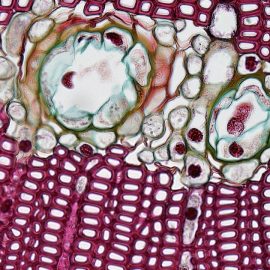

This article is an excerpt from the Shortform book guide to "Super Human" by Dave Asprey. Shortform has the world's best summaries and analyses of books you should be reading.
Like this article? Sign up for a free trial here.
What do gut bacteria do? How are they associated with your overall health?
In Super Human, Dave Asprey discusses how you can slow down your biological aging and live longer, and he explains how gut bacteria play a role. He suggests two methods for rebalancing gut bacteria: adding more fiber to your diet and reducing your exposure to antibacterial products and antibiotics.
Learn the details of Asprey’s advice on how to balance gut bacteria.
How to Balance Gut Bacteria
Asprey explains that it’s important to know how to balance gut bacteria because such an imbalance is a cause of mitochondrial inefficiency. Mitochondrial inefficiency leads to poor health and accelerated aging.
Asprey explains that gut bacteria help maintain the integrity of your gut lining—the barrier between your digestive tract and bloodstream. Your gut lining plays a massive part in the health of your immune system because it absorbs necessary nutrients from your bloodstream and prevents toxins from your digestive tract from leaking into your bloodstream. However, when your gut bacteria are out of balance, your gut lining breaks down, fails to absorb nutrients, and leaks toxins into your bloodstream.
According to Asprey, various factors cause gut bacteria to become imbalanced, including eating produce derived from animals that have been fed antibiotics or from crops sprayed with insecticides, using antibiotics or antibacterial soaps, and consuming an insufficient amount of fiber.
| Symptoms of Imbalanced Gut Bacteria While Asprey details the causes and effects of imbalanced gut bacteria, he doesn’t include information on how you might determine whether this is an issue you’re dealing with. Physicians provide a list of symptoms to keep an eye out for: —Autoimmune problems, such as thyroid issues, rheumatoid arthritis, or type 1 diabetes —Digestive issues, such as irritable bowel syndrome, constipation, diarrhea, heartburn, or bloating —Excessive sugar cravings —Chronic fatigue or problems sleeping —Skin irritations, such as rashes or allergies —Mood disorders, such as depression or anxiety —Unexplained weight fluctuations |
Let’s explore Asprey’s advice on how to balance gut bacteria.
Method #1: Add More Fiber to Your Diet
The first method for rebalancing your gut bacteria is to add more fiber to your diet. Asprey explains that fiber feeds your healthy bacteria (leading them to multiply) and provides the perfect environment for them to thrive. He suggests that you can maximize your production of healthy gut bacteria by eating lots of fibrous vegetables and consuming 10 to 30 grams of powdered fiber each day.
(Shortform note: Research validates Asprey’s claim that fiber feeds your healthy gut bacteria, leading them to multiply. However, while there’s no disputing the benefit of consuming more fiber, proceed with caution: Gradually introduce fibrous foods into your diet. Research reveals that dramatically increasing your daily intake can cause adverse side effects. These effects include bloating, abdominal pain, flatulence, diarrhea, constipation, and temporary weight gain. It can also create complications for people with Crohn’s disease or diabetes.)
Additionally, opting for organic foods will reduce your exposure to the damaging insecticides and antibiotics used in the production of processed foods.
(Shortform note: While organic foods are free from insecticides and antibiotics, they do have three disadvantages to consider before making a big change in the way you shop and eat. First, they require higher overhead costs to produce, which makes them more expensive than conventional produce. Second, they’re produced without artificial preservatives, which means they spoil quickly. Third, they’re not entirely free from contamination—for example, various studies show that organic foods play a part in foodborne disease outbreaks such as E. coli infection.)
Method #2: Reduce Your Exposure to Antibacterial Products and Antibiotics
Asprey suggests that, in addition to eating more fiber, you can stimulate the production of healthy gut bacteria by reducing your exposure to antibacterial products and replacing antibiotics with ozone therapy—a treatment that administers ozone gas directly into your body to aid self-healing.
(Shortform note: While some doctors agree that reducing exposure to antibacterial products and antibiotics promotes healthy gut bacteria, they express concerns about how little research exists regarding the safety and effectiveness of ozone therapy. Some possible side effects of this therapy include air embolisms that can lead to a stroke or a heart attack, abdominal cramping, and flu-like symptoms. Due to the lack of substantial evidence regarding both the benefits and side effects of ozone therapy, the Food and Drug Administration (FDA) has yet to authorize or regulate it. However, it has issued a warning against using ozone therapy.)

———End of Preview———
Like what you just read? Read the rest of the world's best book summary and analysis of Dave Asprey's "Super Human" at Shortform.
Here's what you'll find in our full Super Human summary:
- How to grow older without the negative side effects
- A look into the advancements of anti-aging science
- Why a healthy future starts with making changes now






